1.Introduction
英语论文分析学习 第1节 introduction
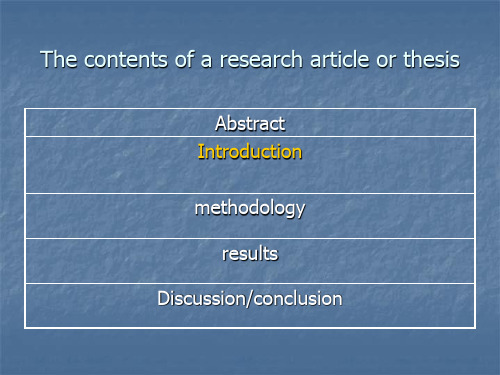
What Is an Introduction?
What questions will readers ask when reading an essay: 1. What topic am I going to learn about? 2. Why is that topic important? 3. Do I know the topic already? What do I know already? An introduction aims to answer these 3 questions.
Contents of an introduction
Example:
"Numerous studies on the utilization of plant proteins as a partial or complete replacement for fish meal in diets have been conducted using various freshwater and marines fishes (Lovell, 1987; Tacon et al., 1983; Murai et al., 1989a; Cowey et al., 1974).
Contents of an introduction
Q: What are the ways to establish a topic? A: Claiming centrality General to specific Previous research Describing of the background Definition of key words
[英语学习]unit-1-Introduction
![[英语学习]unit-1-Introduction](https://img.taocdn.com/s3/m/c54459bff7ec4afe05a1df71.png)
展。
• a Panorama of Publishing 出版业概况 • book industry 图书出版业 • book community 书业团体
Questions on part 1
• 1 [+ obj] : to prepare and produce (a book, magazine, etc.) for sale ▪ It's a small company that only publishes about four books a year. ▪ The university press publishes academic titles. ▪ The newspaper is published daily. 2 : to have something you wrote included in a book, magazine, newspaper, etc. [no obj] ▪ There is a lot of pressure for professors to publish regularly. [+ obj] ▪ He has not published anything for a long time. 3 [+ obj] : to include (an article, letter, photograph, etc.) in a magazine or newspaper ▪ The magazine published two of my stories.
3. intriguing
跨文化交际 1 Introduction
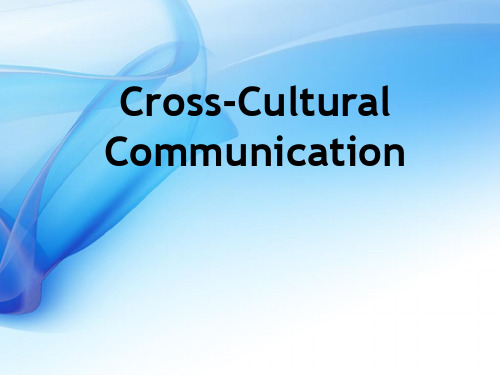
Discuss what communication is
a) Activity: Discuss what the communication is and its significance and function.
b) Definition of communication
1. Communication, the basis of all human contact, occurs anywhere there are human beings. 2. In its most general sense, communication refers to the share or exchange of information, ideas, feelings and so on. Put simply, it means getting across our ideas, views, feelings, emotions, etc.
We are now in a quite different world from before, which is sometimes referred to as a global village. This globalization is mainly due to the rapid development of science and technology in the areas of transportation and communication systems. It naturally follows that intercultural contact has become more frequent, more abundant and, therefore, more significant than ever before.
1-introduction (s)(1-简介)

Marketing is so much more than that!(营销远 不止这些)
Packaging(包装) Strategy(策略) Competitive Strategies(竞 Sales, Sales-force 争优势) (销售,销售队伍) Market Penetration(市场 Brand Management 渗透) (品牌管理) Quality(质量)
Meaning:
Creating customer value and satisfaction are at the heart of modern marketing thinking A very simple definition of marketing is the delivery of customer satisfaction at a profit. Goals of marketing are to attract new customers by promising superior value and to keep and grow current customers by delivering satisfaction. Marketing is much more than selling and advertising. It is about understanding and satisfying customer needs.
Logistics(物流) Location(定位) Distribution Channels(分销渠道) Pricing Considerations(价格策略)
Globalization(全球化)
New Product Develop(新产品开发) Service Delivery(服务交付)
1.Introduction+structures

I. Classification of Writings
A. Literature Writings B. Scientific Writings (factual writings)
II. Principles for Good Scientific Writing (1)
Content: original Organization/Structure: complete, coherent Language: correct 文风有独创性;主题 处理好; 中心思想明确; 行文逻辑严密;选辞精确;句子、段落表达 完整;阅读效果好;没有错别字及语法、标 点符号的错误。
Brief & Simple
Though I usually go to the country for a walk during the weekend, I decided to spend the whole day in the city for a change last Sunday. I went to the Tian’anmen Square and the Zhongshan Park. It was so early when I left home that the streets around my neighborhood were deserted. Without the usual crowds and traffic, everything was strangely quiet.
Writing Suggestions:
Plan your writing (audience awareness / target readers). Ignore the language. Write and rewrite. Find readers. Keep writing. Find suitable methods from handbooks and guides. There is many a way to write.
1Introduction
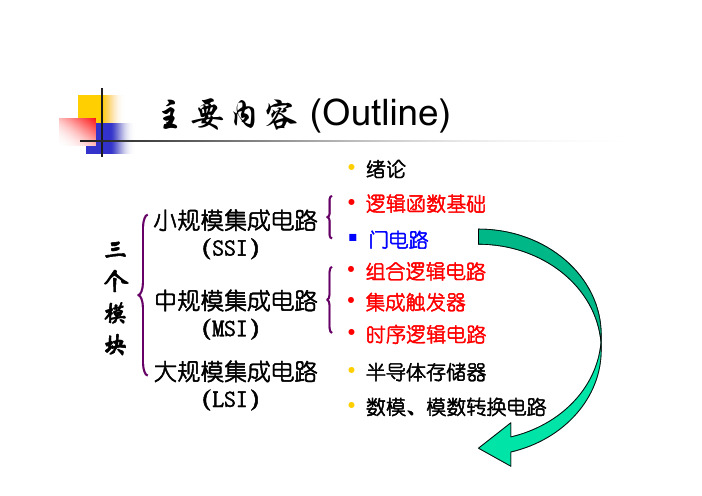
主要内容 (Outline)• 绪论小规模集成电路三(SSI)• 逻辑函数基础 门电路个• 组合逻辑电路模 块中规模集成电路 (MSI)• 集成触发器 • 时序逻辑电路大规模集成电路 • 半导体存储器(LSI)• 数模、模数转换电路绪论 (Introduction)一、数字(digital)信号和模拟(analog)信号 数字量和模拟量 数字电路和模拟电路二、数字信号相关概念 二进制数 Binary Digits 数字信号的逻辑电平 Logic Levels 数字信号波形 Digital Waveforms一、Digital Signal and Analog Signal Digital and Analog Quantities电子 电路 中的 信号模拟信号: 连续analogue signal value数字信号: 离散digital signal valuetime time模拟信号T( C) 30采样信号T( C)sampled3025离散化 2520202 4 6 8 10 12 2 4 6 8 10 12 t (h)A.M.P.M.2 4 6 8 10 12 2 4 6 8 10 12 t (h)A.M.P.M.数字化-表示 为由0、1组成 的二进制码Analog Electronic SystemDigital and Analog Electronic System★ 工作在模拟信号下的电子电路是模拟电路。
研究模拟电路时,注重电路输入、输出信号 间的大小、相位关系。
包括交直流放大器、 滤波器、信号发生器等。
★ 模拟电路中,晶体管一般工作在放大状态。
★ 工作在数字信号下的电子电路是数字电路。
研究数字电路时,注重电路输出、输入间的逻 辑关系。
主要的分析工具是逻辑代数,电路的 功能用真值表、逻辑表达式或波形图表示。
★ 在数字电路中,三极管工作在开关状态, 即工作在饱和状态或截止状态。
新视角研究生英语一,第一单元习题
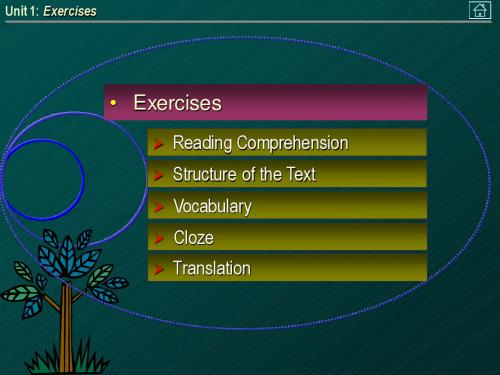
Unit 1: Reading comprehension
4. What does the author mean when she says, “The kaffeklatsch of the fifties is the coffee break of the eighties” (Para. (Para. 9)?
Unit 1: Structure of the text
Text Outline
2. Body (Paras. 5–12) 5– 1) Our sense of community has changed from _______ the the neighborhood to the workplace _________________________________. (Paras. 10) _________________________________. (Paras. 5–10) 2) As our sense of community has changed from the neighborhood to the workplace, our sense of identity from ethnicity to our profession has shifted ____________________________________. ____________________________________.
A. In the past, the community to which we belonged was decided by _____________________________________. _____________________________________. our neighborhoods. (Para. (Para. 5) B. At present, a large part of our daily lives are transformed _________ _______________________________________________ from home to office, the workplace becomes our __________________________________. (Paras. 10) __________________________________. (Paras. 6–10) neighborhood
1.introduction 简介
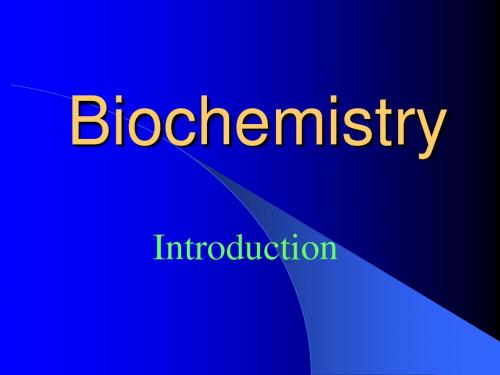
Introduction
1、生物化学的概念 2、生物化学的发展简史
3、生物化学的主要研究内容 4、生物化学与其它学科的关系
生物化学的概念
生物化学是研究生命 化学的学科,它在分子水 平上探讨生命的本质,即 研究生物体的分子结构与 功能,物质代谢与调节, 及其在生命活动中的作用。
①吴宪
在血液化学分析方面创 立了血滤液的制备和血糖测定法; ②蛋白质方面,提出了蛋白质变 性学说; ③免疫学方面,研究抗原抗体的 反应机制;
④1965年,首先人工合成具
有生物活性的胰岛素; ⑤1981年,成功合成酵母丙 氨酰tRNA; ⑥完成人类基因组计划工作 的1%。
生物化学的研究内容
静态生物化学 动态生物化学 1、 功能生物化学 分子生物学 2、生物化学的研究采用化 学的原理和方法; 3、生物化学与细胞学、遗传学、 生理学关系密切;
生物化学的发展简史
1、初级阶段
2、发展阶段 3、分子生物学阶段
4、现状
初级阶段
1、对糖类、脂类、氨基酸作
了比较系统的研究; 2、发现了核酸; 3、化学合成了简单多肽; 4、酵母发酵过程中可溶性催 化剂的发现奠定了酶学的基础。
1、生物大分子的结构与功能; 2、物质代谢及其调节; 3、基因信息的传递及其调控。
生物大分子:由某些 基本结构单位按照一定的 顺序和方式连接所形成的 多聚体。 分子量一般在104以上
生物化学与其他学科的关系
1、与农业的关系 2、与工业的关系 3、与药学的关系 4、与医学的关系
与农业的关系
人类基因组计划
科学研究证明,人类的生老病死
都与基因有关,如果能够破译人 类基因的序列和功能,就有可能 真正有效地预防、诊断和治疗各 种疾病。因此,1990年正式启动 的人类基因组计划一开始就引起 了全世界的广泛关注。
Topic 1 Introduction
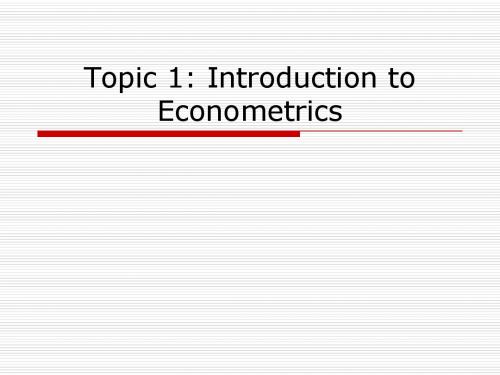
Trygve Haavelmo (Norway)
1980 Nobel Laureates in Economics
Lawrence R. Klein (University of Pennsylvania), “For the creation of econometric models and their application to the analysis of economic fluctuations and economic policies”
Topic 1: Introduction to Econometrics
What is econometrics? Why study econometrics? Types of econometrics Nobel Prize and Econometrics Methodology of econometrics
2. Specification of the Mathematical Model 1) Specification of variables e.g. consumption (income) inflation (money supply of the previous period, GDP growth rate) income (qualification, IQ, EQ, gender, etc.) weight (height, gender, race, age, etc.) * It should be based on economic theory and analysis of economic phenomena * Data availability * The relationship among variables: independence
unit1_introduction
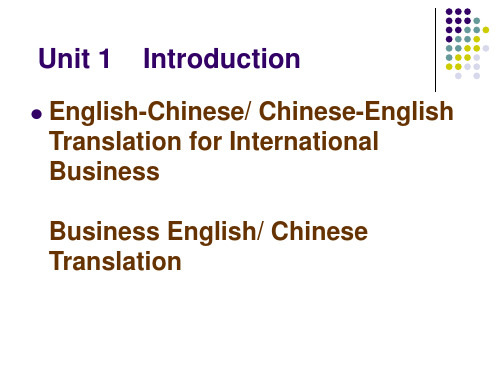
The aim/ purpose of this report is to… This present report sets out to… My purpose in writing/ My purpose of writing this report is to… In writing this report, I aim to… It has been found out that… The findings show that… I found out that…
an insurance policy covering loss of movable property (e.g. jewelry) regardless of its location
Floating policy is of great importance for export trade; it is, in fact, a convenient method of insuring goods where a number of similar export transactions are intended, e.g. where the insured has to supply an oversea importer under an exclusive sales agreement or maintains sales representatives or subsidiary companies abroad. 统保单对出口贸易至关重要。它实际上是货物保险中 的一种便利的办法, 特别适用于分不同的时间出口的 一批类似的货物,如, 被保险方根据独家代理协议书 向国外的进口方供货,或在国外委任了销售代表设立 分支机构时使用。
1. INTRODUCTION
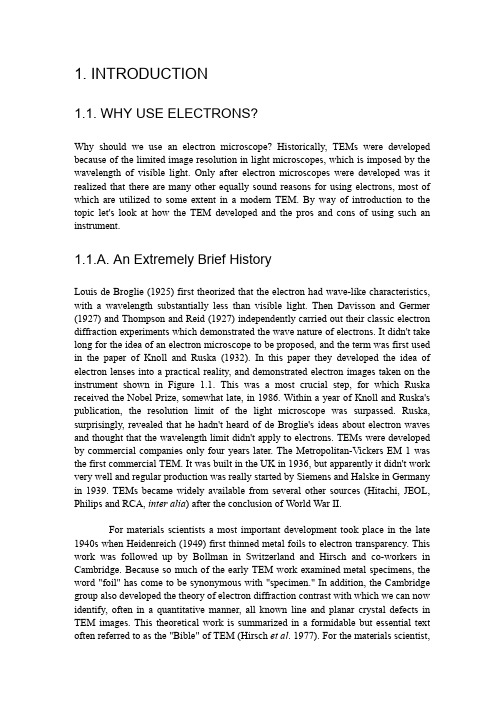
1. INTRODUCTION1.1. WHY USE ELECTRONS?Why should we use an electron microscope? Historically, TEMs were developed because of the limited image resolution in light microscopes, which is imposed by the wavelength of visible light. Only after electron microscopes were developed was it realized that there are many other equally sound reasons for using electrons, most of which are utilized to some extent in a modern TEM. By way of introduction to the topic let's look at how the TEM developed and the pros and cons of using such an instrument.1.1.A. An Extremely Brief HistoryLouis de Broglie (1925) first theorized that the electron had wave-like characteristics, with a wavelength substantially less than visible light. Then Davisson and Germer (1927) and Thompson and Reid (1927) independently carried out their classic electron diffraction experiments which demonstrated the wave nature of electrons. It didn't take long for the idea of an electron microscope to be proposed, and the term was first used in the paper of Knoll and Ruska (1932). In this paper they developed the idea of electron lenses into a practical reality, and demonstrated electron images taken on the instrument shown in Figure 1.1. This was a most crucial step, for which Ruska received the Nobel Prize, somewhat late, in 1986. Within a year of Knoll and Ruska's publication, the resolution limit of the light microscope was surpassed. Ruska, surprisingly, revealed that he hadn't heard of de Broglie's ideas about electron waves and thought that the wavelength limit didn't apply to electrons. TEMs were developed by commercial companies only four years later. The Metropolitan-Vickers EM 1 was the first commercial TEM. It was built in the UK in 1936, but apparently it didn't work very well and regular production was really started by Siemens and Halske in Germany in 1939. TEMs became widely available from several other sources (Hitachi, JEOL, Philips and RCA, inter alia) after the conclusion of World War II.For materials scientists a most important development took place in the late 1940s when Heidenreich (1949) first thinned metal foils to electron transparency. This work was followed up by Bollman in Switzerland and Hirsch and co-workers in Cambridge. Because so much of the early TEM work examined metal specimens, the word "foil" has come to be synonymous with "specimen." In addition, the Cambridge group also developed the theory of electron diffraction contrast with which we can now identify, often in a quantitative manner, all known line and planar crystal defects in TEM images. This theoretical work is summarized in a formidable but essential text often referred to as the "Bible" of TEM (Hirsch et al. 1977). For the materials scientist,practical applications of the TEM for the solution of materials problems were pioneered in the United States by Thomas and first clearly expounded in his text (Thomas 1962). Other materials-oriented texts followed, e.g., Edington (1976) and Thomas and Goringe (1979).Today, TEMs constitute arguably the most efficient and versatile tools for the characterization of materials. If you want to read a history of the TEM, the book by Marton (1968) is a compact, personal monograph and that edited by Hawkes (1985) contains a series of individual reminiscences. Fujita (1986) emphasizes the contribution of Japan to the development of the instrument. The field is now at the point where many of the pioneers have put their memoirs down on paper, or Festschrifts have been organized in their honor (e.g., Cosslett 1979, Ruska 1980, and Hashimoto 1986) which detail their contributions over the decades, and compile some useful overview papers of the field. If you enjoy reading about the history of science, we strongly recommend the review of Fifty Years of Electron Diffraction, edited by Goodman (1981), and Fifty Years of X-ray Diffraction, edited by Ewald (1962). (The spelling of X-ray is discussed in the CBE Manual, 1994.)Figure 1.1. The electron microscope built by Ruska and Knoll in Berlin in the early 1930s.1.1.B. Microscopy and the Concept of ResolutionWhen asked what a "microscope" is, most people would answer that it is an instrument for magnifying things too small to see with the naked eye, and most likely they would be referring to the visible-light microscope. Because of the general familiarity with the concept of the light microscope, we will draw analogies between electron and visible-light microscopes wherever it's instructive.The smallest distance between two points that we can resolve with our eyes is about 0.1-0.2 mm, depending on how good our eyes are, and assuming that there's sufficient illumination to see by. This distance is the resolution or resolving power of our eyes. So any instrument that can show us pictures (or "images" as we'll refer to them) revealing detail finer than 0.1 mm could be described as a microscope, and its highest useful magnification is governed by its resolution. A major attraction to the early developers of the TEM was that, since electrons are smaller than atoms, it would be possible, at least theoretically, to build a microscope that could "see" detail well below the atomic level. The idea of being able to "see" with electrons may be confusing to you. Our eyes are not sensitive to electrons. If a beam of high-energy electrons was aimed into your eye, you would most likely be blinded as the electrons killed the retinal cells, but you wouldn't see anything! So an integral part of any electron microscope is a viewing screen of some form, which translates electron intensity to light intensity, and which we observe or record photographically. We'll discuss these screens and other ways of recording electron images in later chapter.The resolution of a TEM means different things for different functions of the instrument, and we'll discuss them in the appropriate chapters. It's easiest to think of the image resolution in TEM in terms of the classical Rayleigh criterion for light microscopy, which states that the smallest distance that can be resolved, , is given approximately by δβµλ=δsin 61.0 [1.1]In equation 1.1, is the wavelength of the radiation, is the refractive index of the viewing medium, and is the semiangle of collection of the magnifying lens. For the sake of simplicity we can approximate sin (which is sometimes called the numerical aperture) to unity and so the resolution is equal to about half the wavelength of light. For green light in the middle of the visible spectrum, is about 550 nm (5500Å), and so the resolution of a good light microscope is about 300 nm. In TEMs we can approximate the resolution in equation 1.1 to 0.61/ which, as we'll see later, is very small.λµβµβλλβNow although 300 nm is a small dimension to us it corresponds to about 1000 atom diameters, and therefore many of the features that control the properties of materials are on a scale well below the resolution of the light microscope. So there's a real need to image detail down to the atomic level if we want to understand the properties of materials, and that's a major reason why TEMs are so useful.We'll try to use nanometers throughout this book, but you'll find that many microscopists still insist on using Angstroms rather than the SI units. However, the Angstrom is close to the atomic diameter and so is a more convenient unit because it saves us using convoluted phrases like “three tenths of a nanometer.”This limit of light microscopy was well understood at the turn of this century and prompted Ernst Abbe, one of the giants in the field, to complain that "it is poor comfort to hope that human ingenuity will find ways and means of overcoming this limit." (He was right to be so depressed because he died in 1905, some 20 years before de Broglie's ingenuity solved the problem.) Now de Broglie's famous equation shows that the wavelength of electrons is related to their energy, E, and if we ignore relativistic effects we can show approximately (and exactly in Section 1.4 below) that2/122.1~Eλ [1.2]In this equation E is in electron volts (eV) and in nm. Remember that we should be precise in our use of the units V and eV: the former represents the accelerating voltage of the microscope while the latter refers to the energy of the electrons in the microscope. So for a 100-keV electron, we find that ~ 4 pm (0.004 nm), which is much smaller than the diameter of an atom.λλFigure 1.2. A twin boundary in spinel stepping from one {111} plane to another parallel plane. The white dots are columns of atoms. The change in atomic orientation across the twin boundary can be readily seen, even if we do not know what causes the white dots or why, indeed, they are white.We'll see later that we are nowhere near building TEMs that approach this wavelength limit of resolution, because we can't make perfect electron lenses (see Section 2). But progress was rapid after Ruska's early work on lenses and, since the mid-1970s, many commercial TEMs have been capable of resolving individual columns of atoms in crystals, creating the field of "high-resolution transmission electron microscopy," or HRTEM. A typical HRTEM image is shown in Figure 1.2. The advantages of shorter wavelengths led in the 1960s to the development of high voltage electron microscopes (HVEMs), with accelerating potentials between 1 MV and 3 MV . In fact, most of these instruments were used to introduce controlled amounts of radiation damage into specimens in an attempt to simulate nuclear reactor environments, but changes in the emphasis of energy research mean there is not much call for such instruments today. While we can still improve the resolution byincremental amounts, the drive for much better resolution is now no longer paramount and the TEM is developing in other ways. In fact, only one HVEM (1 MV) for HRTEM imaging was constructed in the 1980s and three 1.25-MV machines in the 1990s. Intermediate voltage electron microscopes (IVEMs) were introduced in the 1980s. These TEMs operate at 300 or 400 kV, but still offer very high resolution, close to that achieved at 1 MV.1.1.C. Interaction of Electrons with MatterElectrons are one type of "ionizing radiation," which is the general term given to radiation that is capable of removing one of the tightly bound inner-shell electrons from the attractive field of the nucleus.One of the advantages to using ionizing radiation is that it produces a wide range of secondary signals from the specimen, and some of these are summarized in Figure 1.3. Many of these signals are used in "analytical electron microscopy,'' or AEM, giving us chemical information and a lot of other detail about our samples. AEM uses X-ray energy dispersive spectrometry (XEDS) and electron energy-loss spectrometry (EELS). For example, Figure 1.4A is an X-ray spectrum from a very small region of a TEM specimen showing characteristic peaks which identify the elements present. We can transform such spectra into quantitative data describing elemental changes associated with inhomogeneous microstructures as also shown in Figures 1.4B and C. In contrast, microscopes using nonionizing radiation such as visible light usually only generate light (but not much heat, which is good). AEMs generally offer improved performance at intermediate voltages, similar to HRTEMs.Figure 1.3. Signals generated when a high-energy beam of electrons interacts with a thin specimen. Most of these signals can be detected in different types of TEM. The directions shown for each signal do not always represent the physical direction of the signal but indicate, in a relative manner, where the signal is strongest or where it is detected.In order to get the best signal out of our specimens we have to put the best signal in, and so the electron source is critical. We are now very accomplished in this respect as you'll see in Section 4, so modern TEMs are very good signal-generating instruments. To localize these signals we need to get our TEM to form a very fine electron beam, typically <10 nm and at best <1 nm in diameter. We accomplish this by combining TEM and scanning electron microscope (SEM) technology to create a scanning transmission electron microscope (STEM). The STEM is both the basis for AEMs and a unique scanning imaging microscope in its own right. In fact there are instruments that are only capable of operating in scanning mode and these are sometimes referred to as "dedicated STEMs," or DSTEMs.1.1.D. Depth of FieldThe depth of field of a microscope is a measure of how much of the object we are looking at remains "in focus" at the same time. Like the resolution, this property is governed by the lenses in the microscope. The best electron lens is not a very good one, as we've already mentioned, and has been compared to using the bottom of a Coca-Cola bottle as a lens for light microscopy. To minimize this problem we have to use very small limiting apertures in the lenses, narrowing the beam down to a thin "pencil" of electrons which at most is a few micrometers across. These apertures cut down the intensity of the electron beam, but also act to increase the depth of focus of the images that we produce. Remember that "depth of field" refers to the specimen while "depth of focus" refers to the image.While this large depth of field is chiefly used in the SEM to produce 3D-like images of the surfaces of specimens with large changes in topography, it is also critical in the TEM. It turns out that in the TEM, all of the specimen is usually in focus at the same time, independent of the specimen topography, as long as it's electron transparent! Figure 1.5 shows a TEM image of some dislocations in a crystal. The dislocations appear to start and finish in the specimen, but in fact they are threading their way through the specimen from the top to the bottom, and they remain in sharp focus at all times. Furthermore, we can record the final image at different positions below the final lens of the instrument and it will still be in focus. Compare this with the visible-light microscope where, as you probably know, unless the surface of the specimen is flat to within the wavelength of light, it is not all in focus at the same time. This aspect of TEM gives us both advantages and disadvantages in comparison to the visible-light microscope.A BC Figure 1.4. (A) An X-ray spectrum from asmall biotite crystal showing peaks atenergies that are characteristic of theelements present in the region thatinteracts with the electron beam. Themajor peaks from left to right are for Mg,Al, Si, K, Fe, and the Cu support grid. (B)A TEM image of a precipitate-free zone(PFZ) in an aged Al-16 wt% Ag alloy. (C)The Ag profile across the PFZ in (B),obtained through X-ray spectrometry inthe TEM showing the depletion of Agresponsible for the PFZ formation.Figure 1.5. TEM image of dislocations in GaAs. A band of dislocations threads through the thin specimen from the top to the bottom but remains in focus through the foil thickness.1.1.E. DiffractionThompson and Reid showed that electrons could be diffracted when passing through thin crystals of nickel, and the possibility of combining electron diffraction into TEMs was realized by Kossel and Mollenstedt (1939). Today, electron diffraction is an indispensable part of TEM and is arguably the most useful aspect of TEM for materials scientists. Figure 1.6 shows a TEM diffraction pattern which contains information on the crystal structure, lattice repeat distance, and specimen shape, as well as being a most striking pattern. We'll see that the pattern can always be related to the image of the area of the specimen from which it came, in this case shown in the inset. In addition to the things we just listed, you can conduct a complete crystallographic symmetry analysis of minuscule crystals, including such esoteric aspects as point-group and space-group determination, and at all times the crystallography can be related to the image of your specimen. There is no similar capability on a light microscope because of the relatively large wavelength of visible light.So an electron microscope can produce atomic level images, can generate a variety of signals telling you about your sample chemistry and crystallography, and you can always produce images that are in focus. There are many other good reasons why you should use electron microscopes. We hope they will become evident as you read through this book. At the same time there are many reasons why you should not always seek to solve your problems with the TEM, and it is most important that you realize what the instrument cannot do, as well as knowing its capabilities.Figure 1.6. TEM diffraction pattern from a thin foil of A1-Li-Cu containing various precipitate phases, shown in the inset image. The central spot (X) contains electrons that come directly through the foil and the other spots and lines are diffracted electrons which are scattered from different crystal planes.。
动态优化Dynamic Optimization 1p1 Lecture 1. Introduction
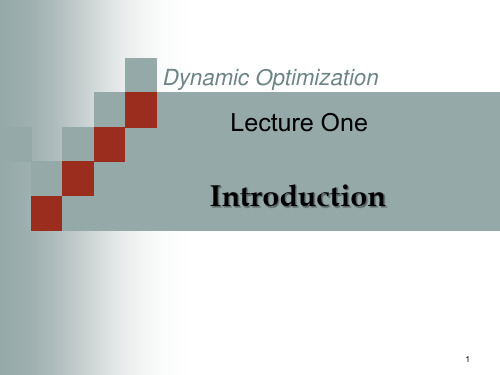
... 2 ∂ L / ∂x1∂xk k (−1) ∂g1 / ∂x1 ... ∂g m / ∂x1
... ∂ 2 L / ∂x1∂xk ... 2 ... ∂ 2 L / ∂x1 ∂g1 / ∂xk ... ... ... ∂g m / ∂xk
∂g1 / ∂x1 ... ∂g1 / ∂xk 0 ... 0
Necessary
conditions for a point x* to maximize a twice continuously differentiable function f(x): f ′( x* ) = 0 ( F .O.C )
f ′′( x* ) ≤ 0 ( S .O.C )
5
Nonlinear Programming
For
a twice continuously differentiable function f(x1,x2,…,xn) of n variables, necessary conditions for x*=[x*1,x*2,…,x*n] to maximize f(x1,x2,…,xn) is: F.O.C.: f i ( x1 , x2 ,..., xn ) = 0, i = 1,2,..., n
6
Nonlinear Programming: Example 1
Maximize f ( x, y ) = xy + 9 y − x 2 − y 3 / 12 F.O.C.: f = y − 2 x = 0 x 2 − = + 9 /4=0 x f x y They are satisfied at (1/2 + (37/4)1/2,1 + 371/2) and at (1/2 − (37/4)1/2,1 − 371/2). S.O.C.: f = −2 < 0, f xx xy = 1, f yy = − y / 2 < 0 −2 1 H = 1 − y / 2 = y −1 They are satisfied at the first solution.
大学英语综合教程第三册unit1分析

Unit objectives
Objectives: The unit aims to help students
Apply critical thinking to different writing tasks, such as essays, reports, and reviews.
Improve their writing skills, including essay structure, argumentation, and language use.
02
text analysis
Topic of the text
Topic
The text is about the topic of "The Secret of Success". It mainly discusses the factors that lead to success, including perseverance, hard work, positive attitude, and good habits.
Text Organization
Introduction
Body
The text begins with an introduction that sets the scene and introduces the topic of "The Secret of Success". It also provides a brief overview of the main points that will be covered in the text.
1. Introduction
This section provides an overview of the unit and introduces the theme of critical thinking and writing.
1-4单元《新编语言学教程》课后答案
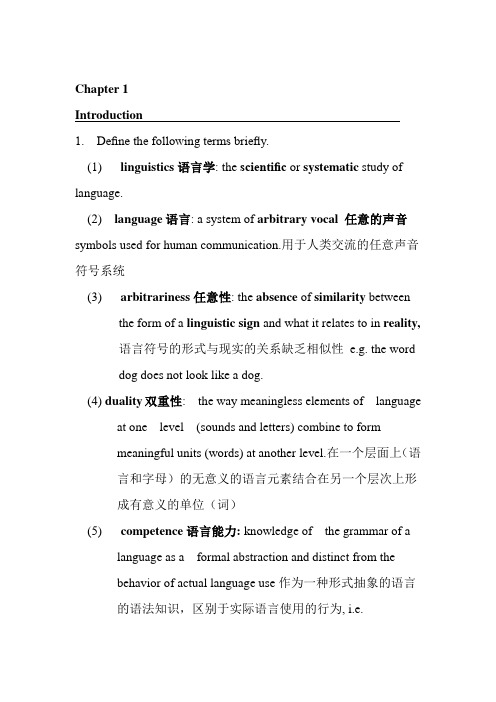
Chapter 1Introduction1. Define the following terms briefly.(1) linguistics语言学: the scientific or systematic study of language.(2) language语言: a system of arbitrary vocal 任意的声音symbols used for human communication.用于人类交流的任意声音符号系统(3) arbitrariness任意性: the absence of similarity betweenthe form of a linguistic sign and what it relates to in reality,语言符号的形式与现实的关系缺乏相似性e.g. the worddog does not look like a dog.(4) duality双重性: the way meaningless elements of languageat one level (sounds and letters) combine to formmeaningful units (words) at another level.在一个层面上(语言和字母)的无意义的语言元素结合在另一个层次上形成有意义的单位(词)(5) competence语言能力: knowledge of the grammar of alanguage as a formal abstraction and distinct from thebehavior of actual language use作为一种形式抽象的语言的语法知识,区别于实际语言使用的行为, i.e.performance.(6) performance语言运用: Chomsky’s term for actuallanguage behavior as distinct from the knowledge thatunderlies it, or competence.乔姆斯基对实际语言行为的术语不同于它的知识,或能力。
【精选】跨文化交际word版(1)
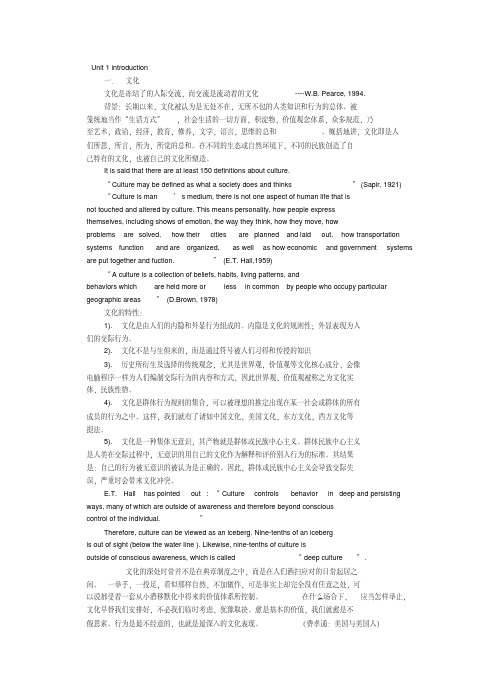
Unit 1 introduction一.文化文化是冻结了的人际交流,而交流是流动着的文化----W.B. Pearce, 1994.背景:长期以来,文化被认为是无处不在,无所不包的人类知识和行为的总体。
被笼统地当作“生活方式”,社会生活的一切方面,积淀物,价值观念体系,众多规范,乃至艺术,政治,经济,教育,修养,文学,语言,思维的总和。
概括地讲,文化即是人们所思,所言,所为,所觉的总和。
在不同的生态或自然环境下,不同的民族创造了自己特有的文化,也被自己的文化所塑造。
It is said that there are at least 150 definitions about culture.“Culture may be defined as what a society does and thinks”(Sapir, 1921) “Culture is man’s medium, there is not one aspect of human life that isnot touched and altered by culture. This means personality, how people expressthemselves, including shows of emotion, the way they think, how they move, howproblems are solved, how their cities are planned and laid out, how transportation systems function and are organized, as well as how economic and government systems are put together and fuction.” (E.T. Hall,1959)“A culture is a collection of beliefs, habits, living patterns, andbehaviors which are held more or less in common by people who occupy particular geographic areas” (D.Brown, 1978)文化的特性:1). 文化是由人们的内隐和外显行为组成的。
1.introduction

Introduction to Immunology
Liu chun 2016 – 03 – 01
1
一、发展史:
古老: 16世纪 人痘预防天花
① 接触法 ② 痘浆法 ③ 旱苗法 ④ 水苗法
18世纪 牛痘预防天花 ( Jenner )
Edward Jenner discovered that cowpox vaccination protected against smallpox in 1796. Officially smallpox eradicated in 1979.
中 枢
2、未成熟 LC克隆遇Ag 刺激后发生克隆清除; 成 熟 LC克隆遇Ag刺激后则 活化增殖分化,并清除Ag; 3、由于未成熟 LC克隆 在胸腺、骨髓中与自身Ag 相遇而致自身反应性LC克 隆清除;所以成熟LC克隆 主要针对外来Ag。因而免
疫系统能区别自己与非己。
外 周
7
克隆选择学说 ( Burnet )
44
20世纪获得诺贝尔医学生理学奖的免疫学家
年代 1901 1905 1908 1912 1913 1919 1930 1951 1957 1960 1972 1977 1980 学者姓名 Behring Koch Ehrlich Metchnikoff Carrel Richet Bordet Landsteiner Theler Bovet Burnet Medawar Edelman Porter Yalow Dausset Snell Benacerraf Jerne Kohler Milstein Tonegawa Murray Thomas Doherty Zinkernagel 国家 德国 德国 德国 俄国 法国 法国 比利时 奥地利 南非 意大利 澳大利亚 英国 美国 英国 美国 法国 美国 美国 丹麦 德国 阿根廷 日本 美国 美国 澳大利亚 瑞士 获奖成就 发现抗毒素,开创免疫血清疗法 发现结核杆菌,发明诊断结核病的结核菌素 提出抗体生成侧链学说和体液免疫学说 发现细胞吞噬作用,提出细胞免疫学说 器官移植 发现过敏现象 发现补体, 建立补体结合试验 发现人红细胞血型 发明黄热病疫苗 抗组胺药治疗超敏反应 提出抗体生成的克隆选择学说 发现获得性移植免疫耐受性 阐明抗体的化学结构 阐明抗体的化学结构 创立放射免疫测定法 发现人白细胞抗原 发现小鼠H-2系统 发现免疫应答的遗传控制 提出天然抗体选择学说和免疫网络学说 杂交瘤技术制备单克隆抗体 单克隆抗体技术及Ig基因表达的遗传控制 抗体多样性的遗传基础 第一例肾移植成功 第一例骨髓移植成功 提出MHC限制性,即T细胞的双识别模式 提出MHC限制性,即T细胞的双识别模式
新视角研究生英语 读说写 课后题答案1
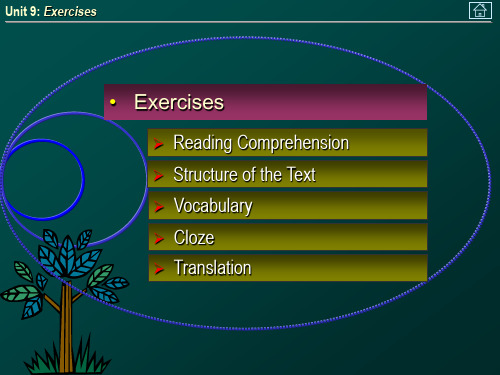
It is ironical since in these positions that women do the same jobs and wear the same or similar uniforms as men, and this sameness implies that women should not be differentiated from men. However, such a presupposition has been broken by the reality that many women are suffering from gender bias.
Unit 9: Structure of the text
Text Outline
2. Body (Paras. 5–12)
1) The on-the-job gender discrimination (Paras. 2–7)
A. Wage bias, which means___________________________ employees are paid less those of the opposite gender for doing the same work ________________________________________________. it is difficult B. The glass ceiling, which means _____________________ for women to advance up the corporate ladder. _______________________________________________ .
1. Introduction

Belt Analyst TM is a belt conveyor mathematical modeling tool developed by Overland Conveyor Co., Inc. It is the most easy-to-use engineering calculation program available today. Formulas in this program generally follow the form as published in the 5th and 6th Editions of BELT CONVEYORSFOR BULK MATERIALS as published by CEMA.The use of computers in the design of conveyor systems and the selection of components such as conveyor belt, idlers, drives and takeups, have enabled engineers to simulate almost any imaginable service condition and design accordingly. However, the traditional methodology to conveyor design is the use of rigid mechanics. This approach assumes the conveyor belt to be a rigid member and react accordingly. Up until a few years ago, this was adequate for most engineers' needs.As much longer conveyors with much greater loads became reality and unexplained problems arise, engineers became aware of these deficiencies. Many times, high service factors were used to offset the unknowns that occurred during the critical periods of acceleration and deceleration. During these periods, the elastic conveyor belt can react in a much less predictable pattern than a conveyor which is running at full speed.The computer results from Belt Analyst TM are based on the traditional rigid body theory. The dynamic modeling, essential on long overland flights, high tension conveyors and/or high speed conveyors requires much more information on the exact starting and stopping characteristics of the drive systems.If a dynamic analysis is required, please contact Overland Conveyor Co., Inc. for more information.Help Version 9.3.0CopyrightThis main source code and compiled executable applications of Belt Analyst TM is protected by United States copyright laws and international treaty provisions. You may make one copy of Belt Analyst TM solely for backup and archival purposes.You may not otherwise copy Belt Analyst TM or any accompanying written materials.Belt Analyst TM Copyright 1999 - 2010 Overland Conveyor Company, Inc., Lakewood, Colorado, USA.Disclaimer NoticeThis software and the information contained in the accompanying database have been prepared in accordance with recognized engineering principles.While it is believed to be accurate, this software and database information should not be used or reliedupon for any specific application without competent professional examination and verification for its accuracy, suitability, and applicability by a reputable conveyor engineer.Overland Conveyor Co., Inc. for itself and its respective agents and employees, disclaims any and allexpress or implied warranties, without limitation, and particularly those of fitness for any general or particular use or purpose, or of freedom from infringement of any patent, trademark, or copyright inregard to information contained or referred to herein.Nothing contained herein shall be construed as granting a license, express or implied, under any patents or copyrights.Technical SupportUse the following options for technical help:1.Belt Analyst TM help files.3.E-mail -BeltAnalyst@4.Telephone - (303) 973-7357 Office5.Fax - (303) 217-5208Demo ProgramThe Demo program is actually a complete, full featured copy of the Belt Analyst TM software package. The demo can be evaluated for 30 days after it is installed on a computer. The number of evaluation days remaining is displayed on the splash screen in the License Status field when the program boots up. The splash screen can also be accessed from the program by selecting the File / License Information menu item.After the 30-day evaluation period is over the program will become a "Read Only" version beyond the splash screen. To activate the program the user will have to go through the licensing procedure which can be accessed by depressing the License button on the splash screen.The software will not let the user initiate a second evaluation period on the same computer. However, the software will allow the user to install a 30-day evaluation copy on as many different computers as desired. Overland Conveyor Co., Inc. encourages the sharing of the evaluation software with otherusers.The most up-to-date version of Belt Analyst TM can be downloaded over the internet fromPurchase / RegistrationBelt Analyst TM purchase information can be found on the web site . Call for special rates on a network version or for multiple single user copies.Please call with a credit card number or P.O. number.1-888-252-7665 Toll Free1-303-217-5207 Voice1-303-217-5208 FaxThe toll-free number will be answered between 9:00 AM and 4:00 PM CST Monday through Friday.A site code (see licensing procedure) to activate your software can be delivered via telephone, fax, e-mail or post.For more purchasing information use the following e-mail address:SalesInfo@ReferencesWhile it is believed to be accurate, this software and database information should not be used or relied upon for any specific application without competent professional examination and verification for its accuracy, suitability, and applicability by a reputable engineer. There are several references to the proper design of a belt conveyor.BELT CONVEYORS FOR BULK MATERIALS, 5th Edition, Conveyor Equipment Manufacturers Association, 1997BELT CONVEYORS FOR BULK MATERIALS, 6th Edition, Conveyor Equipment Manufacturers Association, 2005License AgreementOverland Software License AgreementThis Software License Agreement (Agreement) is made effective as of the date of purchase or first use of the Belt Analyst TM, between the Licensee and Overland Conveyor Company, Inc., with offices at 12640 West Cedar Drive, Suite D, Lakewood, Colorado 80228 ("Overland").This Agreement pertains to Overland's software, called Belt Analyst TM, including object code and documentation. Overland has the sole and exclusive ownership of all right, title, and interest in and toBelt Analyst TM source code, object code and documentation, and all copies thereof, and allmodifications and enhancements thereto (including ownership of all copyrights and other intellectual property rights pertaining thereto), subject only to the license expressly granted to the Licensee herein. This Software License Agreement does not provide the Licensee with title or ownership ofBelt Analyst TM, but only a right of limited use. From time to time, at its sole discretion, Overland Conveyor Co., Inc may provide enhancement, updates or newer versions of the software on its then standard terms and conditions thereof. This agreement shall apply to such enhancements.In exchange for the non-exclusive, non-transferable license to use Belt Analyst TM and subject to the terms and provisions of this agreement, Overland and the Licensee agree as follows:I. PAYMENTSThe Licensee agrees to pay Overland the then current fees for Belt Analyst TM, and for any additional licenses required for use of Belt Analyst TM on additional computers.II. LIMITED USE LICENSEA. Overland Conveyor Co., Inc grants Licensee the right to use one copy of the enclosed Belt Analyst TM software program, which includes computer software and may include associated media, printed materials and electronic documentation on a single terminal connected to a single computer (that is, with a single CPU) or in a networked environment according to the product purchased.B. The Licensee may not:1. Network the software or otherwise use it on more than one computer terminal at the same time unless the networked version is purchased;2. Allow any third party to use Belt Analyst TM without a non-disclosure agreement approved by Overland;3. Sub-license or lease Belt Analyst TM to another party; or4. Otherwise transfer or permit use of the software in any way without prior written consent of Overland; or5. Reverse engineer, de-compile, or disassemble the software.C. Overland may at reasonable times inspect the Licensee's premises and equipment to verify that all of the terms and conditions of this Agreement are being observed.III. PROGRAM CODE & DOCUMENTATIONThe licensed products shall be provided to Licensee and used strictly in machine-readable object code format. Licensee shall have no right of access or use of the Source Code.IV. NO TRANSFER OF RIGHTSThere is no transfer to the Licensee of any title or ownership of any component of Belt Analyst TM or any patent, copyright, trade secret, trade name, trademark or other rights related to Belt Analyst TM , regardless of the form that original or other copies exist in. The Licensee shall exercise the same degree of care in protecting Overland's rights under this Agreement as the Licensee exercises in protecting its own rights involving similar material.V. COPYINGA. The Licensee may make copies of Belt Analyst TM software for nonproductive backup purposes only, provided that the Licensee reproduce and include Overland's copyright notice on each backup copy. Backup copies must be stored in a safe and secure location. The Licensee must maintain an accurate record of the location of backup copies at all times.B. Documentation that accompanies Belt Analyst TM is copyrighted and the sole property of Overland, and is provided solely to support the authorized use of Belt Analyst TM. The Licensee may not use, copy, modify or distribute such material or any copy, adaptation, transcription or merged portion thereof, except as expressly authorized by a separate written agreement with Overland.VI. COPYRIGHTSOverland represents and warrants to the Licensee that Belt AnalystTM software, names and marks and documentation are either patented, copyrighted, trademarked, or otherwise proprietary to Overland. The Licensee agrees to never remove any such copyrights, trademark notices, other notices and logos from Belt Analyst TM software and documentation.VII. TRANSFER OR ASSIGNMENTSThe Licensee may not transfer or assign this License, Belt Analyst TM object code, sample programs, or documentation to another party without written approval of Overland. No transfer will be approved unless it includes updates and all prior versions. Provided, however, nothing contained herein shall operate to prevent the Licensee from selling, assigning or transferring this License Agreement to any person or other entity that acquires ownership or management control of the Licensee. The transferee shall agree in writing, if so requested by Overland, to be bound by the duties and obligations of the transferring party (the Licensee) under this License Agreement.VIII. TERMINATIONThis License is effective until terminated. The Licensee may terminate this License Agreement by providing written notice to Overland and destroying the Belt Analyst TM software, documentation and all copies thereof. This License will terminate as provided herein if the Licensee fails to comply with any provision of this License or fails to pay license fees in the amounts and according to terms and conditions shown in Schedule A. This Agreement may be terminated by either party upon written notice should the other party fail substantially to perform in accordance with its terms through no fault of the party initiating the termination. However, prior to termination under this paragraph, the party desiring to terminate shall first provide written notice specifying the alleged nonperformance and allowing the non-performing party a reasonable time to perform. In the event of nonpayment of money by the Licensee, a reasonable time for performance shall be seven calendar days following the Licensee's receipt of a certified letter from Overland. In the event of other types of nonperformance, the non-performing party shall be allowed such time as is under the circumstances reasonably necessary to allow it to perform. Upon termination, the Licensee shall destroy all copies of Belt Analyst TM software and documentation. After termination, all provisions regarding ownership, warranty, confidentiality, indemnity, liability and limits thereon shall survive.IX. LIMITED WARRANTY, DISCLAIMER OF WARRANTY, AND LIMITATION OF REMEDIES AND LIABILITIES.A. Overland warrants and represents to the Licensee that:1. Overland is the owner of Belt Analyst TM or otherwise has the right to grant to the Licensee this license to use Belt Analyst TM ;2. No applicable statute or regulation has been or will be violated by the licensing of Belt Analyst TM to the Licensee under this Agreement;3. There is currently no suit by any third party based on an alleged violation of Overland's right to license Belt Analyst TM ; and4. Upon delivery by Overland and acceptance by the Licensee, Belt Analyst TM will substantially conform to the Reference Manuals provided by Overland.B. OVERLAND DOES NOT WARRANT THAT UNIT ANALYST OR ANY OTHER DELIVERABLES PROVIDED HEREUNDER WILL MEET THE LICENSEE'S REQUIREMENTS OR THAT THE OPERATION OF Belt Analyst TM WILL BE UNINTERRUPTED OR ERROR FREE. OVERLAND MAKES NO OTHER WARRANTIES, EXPRESSED OR IMPLIED, INCLUDING WARRANTIES OF FITNESS FOR A PARTICULAR PURPOSE, MERCHANTABILITY, TITLE, ACCURACY, AND INTEGRATION.C. THE PARTIES ACKNOWLEDGE THAT THE FOLLOWING PROVISIONS HAVE BEEN NEGOTIATED BY THEM AND REFLECT A FAIR ALLOCATION OF RISK. THIS WARRANTY AND DISCLAIMER GIVES THE LICENSEE SPECIFIC LEGAL RIGHTS AND THE LICENSEE MAY HAVE OTHER RIGHTS THAT VARY FROM STATE TO STATE. IF Belt Analyst TM FAILS TO COMPLY WITH THE WARRANTIES SET FORTH ABOVE, OVERLAND WILL MAKE A REASONABLE EFFORT TO CORRECT PROGRAM ERRORS WITHIN A REASONABLE PERIOD OF TIME. IF OVERLAND IS UNABLE TO CORRECT THE PROGRAM ERRORS, OVERLAND WILL REFUND A FAIR PORTION OF THE SOFTWARE LICENSE FEES THE LICENSEE PAID OVERLAND WITHIN THE IMMEDIATELY PRECEDING TWELVE MONTHS. SUCH REFUND WILL FULLY SATISFY THE LICENSEE'S CLAIMS FOR SOFTWARE FAILURE. ANY REPLACEMENT SOFTWARE WILL BE WARRANTED ACCORDING TO THE TERMS AND CONDITIONS OF THIS AGREEMENT.THE REMEDY STATED HEREIN IS IN LIEU OF ALL OTHER REMEDIES.D. THIS SOFTWARE AND THE INFORMATION CONTAINED IN THE ACCOMPANYING DATABASE HAVE BEEN PREPARED IN ACCORDANCE WITH RECOGNIZED ENGINEERING PRINCIPALS. WHILE IT IS BELIEVED TO BE ACCURATE, THIS SOFTWARE AND DATABASE INFORMATION SHOULD NOT BE USED OR RELIED UPON FOR ANY SPECIFIC APPLICATION WITHOUT COMPETENT PROFESSIONAL EXAMINATION AND VERIFICATION OF ITS ACCURACY, SUITABILITY, AND APPLICABILITY AND SAFETY BY A REPUTABLE ENGINEER. OVERLAND, FOR ITSELF AND ITS RESPECTIVE AGENTS AND EMPLOYEES, DISCLAIMS ANY AND ALL EXPRESS OR IMPLIED WARRANTIES, WITHOUT LIMITATION, THAT THE SOFTWARE WILL PRODUCE RESULTS THAT ARE WITHOUT RISK OF INJURY ANY PERSON OR ENTITY.LICENSEE MUST INDEPENDENTLY ASSURE ITSELF THAT USE OF THE SOFTWARE PRODUCES RESULTS THAT ARE SAFE IN ACTUAL USE.E. EXCEPT FOR THE DUTY TO INDEMNIFY PROVIDED IN SECTION X, OVERLAND SHALL NOT BE LIABLE FOR ANY CONSEQUENTIAL DAMAGES OF THE LICENSEE, INCLUDING, BUT NOT LIMITED TO, LOSS OF DATA, REVENUE, PROFITS, CUSTOMERS, OR GOOD WILL. OVERLAND'S LIABILITY FOR A DEFAULT OF THIS AGREEMENT SHALL BE LIMITED TO THE AMOUNT OF THE FEES PAID BY THE LICENSEE TO OVERLAND WITHIN THE PAST TWELVE MONTHS.F. NO WRITTEN OR ORAL INFORMATION OR ADVICE GIVEN BY OVERLAND DEALERS, DISTRIBUTORS, AGENTS, OR EMPLOYEES WILL IN ANY WAY INCREASE OR MODIFY THE SCOPE OF THE WARRANTIES CONTAINED IN THIS AGREEMENT.X. INDEMNIFICATIONA. Overland shall indemnify, defend and hold harmless the Licensee, its shareholders, directors,officers, and employees from any and all claims for damages, losses, lawsuits, fines, penalties, costs and expenses of third parties relating to or arising out of any claim that the use of Belt Analyst TM by the Licensee under this Agreement infringes on any United States patent, copyright, trademark, orother proprietary right, provided that the Licensee gives Overland prompt written notice of such suits and permits Overland to control the defense thereof. In the event, as a result of any claim or infringement which Overland has an obligation to defend in accordance with this section, Licensee is enjoined from using Belt Analyst TM , or if Overland believes Belt Analyst TM is likely to become the subject of such a claim of infringement, Overland, at its option and expense, may procure the right for the Licensee to continue to use Belt Analyst TM or replace or modify Belt Analyst TM so as to make it non-infringing, provided that the performance thereof is not adversely affected in a material manner. If Overland, in its sole discretion, determines that neither of these options is commercially reasonable, Overland may terminate the license granted herein with respect to the affected software and, as part of its obligations pursuant to this section, refund to the Licensee upon return of the affected software, a fair portion of the license fees the Licensee paid Overland for the affected software within the past twelve months.B. The Licensee shall, at all times defend, indemnify and hold harmless Overland, its officers, directors, shareholders, employees, successors and assigns from and against any and all actions, suits, liabilities, prosecutions, penalties, fines, losses, damages, costs, charges, attorneys' fees and all other expenses relating to or arising from any and all claims which are based upon or due to: any failure by the Licensee to comply with any term or provision of this Agreement; any breach, error or inaccuracy in any representation or warranty made by the Licensee herein; any negligence or willful misconduct by the Licensee, its officers, directors or employees; or any use of the software or results or output of the software which results in injury of any kind to any person or entity.XI. INSTALLATION AND IMPLEMENTATIONA. Licensee is specifically responsible for the following administrative functions associated with the use of Belt Analyst TM :1. Computer hardware maintenance;2. Operating system maintenance;3. Administration and allocation of disk space and4. Creation and execution of a process for regular database backups;5. System security;6. All software that must interact with or interface with Belt Analyst TM.B. Any licensed product shall be deemed accepted by Licensee unless Licensee notifies Overland in writing of a material defect in the licensed product within ten (10) business days after installation of the product. The Licensee may delete the program by executing the "Delete License" command and returning the program generated code proving that such deletion has been performed to Overland within this 10 day period. Refunds after that time are given in the sole discretion of Overland. If material defects are discovered during this time, Licensee shall provide a written "punchlist" identifying the specification at issue and explaining why the Licensed Product does not meet the specification. Overland shall have a reasonable opportunity to correct, replace or provide functional "workarounds" for all punchlist items or to commence corrective action reasonably acceptable to Licensee and proceed with reasonable diligence to completion. Upon notice of correction, the 10 day test period shall be repeated. If Licensee makes substantial beneficial use of the Licensed Product at any time, it shall conclusively be deemed accepted and any outstanding punchlist items shall beaddressed to the extent provided under Section IX ("Warranties") or separate maintenance agreement.C. During the term of this Agreement, Overland shall provide telephone assistance only regarding the use and operation of the then current version of Belt Analyst TM to the Licensee's Belt Analyst TM system manager and one other user designated in writing by the Licensee from Monday through Friday, from 9 AM to 5 PM Mountain Time, except national holidays. The Licensee may change the designated system manager and primary user at any time by providing written notice to Overland.Overland shall have no obligation to provide this support for any version of Belt Analyst TM other than the then current version.D. All additional support or training shall be by separate agreement between Overland and Licensee and is not included in the base price of Belt Analyst TM .XII. ENHANCEMENTSOverland may at any time replace, modify, alter, improve, enhance or change Belt Analyst TM without prior notice.XIII. CONFIDENTIALITYThe Licensee agrees that it not disclose confidential information of the Overland to any person or entity outside Licensee's organization without first obtaining written consent of Overland. The confidential information of Overland includes but is not limited to Belt Analyst TM and Belt Analyst TM help files. These obligations do not include information which may become publicly available. Licensee may not use Overland's in advertising or for other publicity purposes without the Licensee's prior written consent. Such approval will not be unreasonably withheld. Licensee agrees that it will not disclose the fees or terms of this Agreement to any person or entity outside its organization without first obtaining written consent from Overland.XIV. THIRD PARTY SOFTWARELicensee agrees to separately license all third party software necessary to the operation of Belt Analyst TM . The Licensee is responsible for executing and complying with the separate license agreements associated with these packages.XV. INSTALLATIONA. The Licensee is responsible for:1. Determining whether Belt Analyst TM will achieve its objectives;2. Installing the computer hardware, and third party software, as described in Schedules B and C and operating the computer, operating system and modem thereafter;3. Assigning personnel who will operate Belt Analyst TM ; and4. Establishing backup procedures in the event of a defect or malfunction that renders BeltAnalyst TM or the computer nonoperational.B. The Licensee agrees that Overland is not responsible for installation delays caused by events or circumstances beyond its reasonable control.XVI. GENERAL PROVISIONSA. Notices. All notices shall be sent by hand delivery or by registered or certified mail, return receipt requested, with first-class postage prepaid to the current address of the party.B. Invalid or Unenforceable Provisions. The invalidity or unenforceability of any particular provision of this Agreement shall not affect the other provisions hereof, and this Agreement shall be construed in all respects as if such invalid or unenforceable provisions were omitted.C. Benefit and Burden. This Agreement shall inure to the benefit of, and shall be binding upon, the parties, their legatees, distributees, estates, executors, administrators, personal representatives, successors and assigns, and other legal representatives.D. Gender. The use of any gender herein shall be deemed to be or include the other genders and the use of the singular herein shall be deemed to be or include the plural, and vice versa, where appropriate.E. Changes; Waiver. No change or modification of this Agreement shall be valid unless it is in writing and signed by all the parties. No waiver of any provision of this Agreement shall be valid unless in writing and signed by the person against whom it is sought to be enforced. The failure of any party at any time to insist upon strict performance of any part of this Agreement shall not be construed as a waiver or relinquishment of the right to insist upon strict performance of the same or any other part of this Agreement at a future time.F. Entire Agreement. This Agreement sets forth all of the promises, agreements, conditions, understandings, warranties, and representations of the parties with respect to the Agreement and any other matters set forth herein, and there are no promises, agreements, conditions, understandings, warranties, or representations, oral or written, express or implied, among them with respect to such Agreement or such other matters except as set out in the Agreement. All prior agreements among the parties on the subject of the Agreement are revoked. This Agreement is an integration of all prior agreements or understandings.G. Governing Law and Choice of Forum. This Agreement shall be construed and enforced in accordance with the laws of the State of Colorado. All actions arising under this Agreement or connected with it in any way, whether law or equity, tort or contract, shall be brought and adjudicated in a court of competent jurisdiction in Littleton, Colorado.H. Headings. The headings, subheadings, and other captions in this Agreement are for convenience and reference only and shall not be used in interpreting, construing, or enforcing any of the provisions of this Agreement.I. Damages. In the event any remedy herein is determined to have failed of its essential purpose, all limitations of liability and exclusion of damages set forth herein shall remain in full force and effect.J. Compliance with Law. The Licensee is responsible for complying with all local, state and federal laws pertaining to the use and disclosure of any data.K. Independent Contractor Status. Each party and its people are independent contractors in relation to the other party with respect to all matters arising under this Agreement. Nothing herein shall be deemed to establish a partnership, joint venture, association or employment relationship between the parties. Each party shall remain responsible, and shall indemnify and hold harmless the other party, for the withholding and payment of all Federal, state and local personal income, wage, earnings, occupation, social security, worker's compensation, unemployment, sickness and disability insurance taxes, payroll levies or employee benefit requirements (under ERISA, state law or otherwise) now existing or hereafter enacted and attributable to themselves and their respective people.L. Security, No Conflicts. Each party agrees to inform the other of any information made available tothe other party that is classified or restricted data, agrees to comply with the security requirementsimposed by any state or local government, or by the United States Government, and shall return all such material upon request. Each party represents and warrants that its participation in this Agreement does not conflict with any contractual or other obligation of the party or create any conflict of interestprohibited by the U.S. Government or any other government and shall promptly notify the other party if any such conflict arises during the Term.M. Compliance with Export Regulations. Licensee has or shall obtain in a timely manner all necessary or appropriate licenses, permits or other governmental authorizations or approvals; shall indemnify and hold Licensor harmless from, and bear all expense of, complying with all foreign or domestic laws, regulations or requirements pertaining to the importation, exportation, or use of the technology to be developed or provided herein. Licensee shall not directly or indirectly export or re-export (including by transmission) any regulated technology to any country to which such activity is restricted by U.S. regulation or statute, without the prior written consent, if required, of the Bureau of Export Administration of the U.S. Department of Commerce. This provision and the assurances made herein shall survive termination of this Agreement.XVII. NOTICESNotices regarding this Agreement should be delivered in writing to:From the Licensee to Overland:Overland Conveyor Company, Inc.12640 West Cedar Drive, Suite DLakewood, Colorado 80228XVIII. ACCEPTANCE OF AGREEMENTThis Agreement is accepted by Licensee by clicking "Accept," or installing or using the software in any way.Program VersionsSeveral versions of the program are available offering different levels of program features. For an up-to-date listing of the program features, visit .Lite Std ProNumber of Flights20100360Number of Drives1520Number of Pulleys61248Maximum InstalledPower300nolimitnolimitEnglish and MetricUnitsüMaterial Selection withavailable Database。
chapter 1(1) introduction

“ Thank you very much, I really want appreciate it! I just try to do my best every time I step on the coment
Ms. Deng, you are the best!”
——引自何道宽:介绍一门新兴学科——跨文化的交际,载《外国语 引自何道宽:介绍一门新兴学科 跨文化的交际, 引自何道宽 跨文化的交际 文教学》1983年第 年第2 文教学》1983年第2期
case one :compliment
“Mr. Jordan, I am so happy to meet you. I just want to tell you, you are the best basketball player in the world; you are the greatest!”
Discuss the definition of culture
• Culture is the total way of life that a group of people shares. • Culture is a system of shared beliefs, values, customs, behaviors, and artifacts that the members of a society use to cope with their world and with one another, and that are transmitted from generation to generation through learning.
1. Introduction_to_IFRS_slides-国际财务报告准则介绍
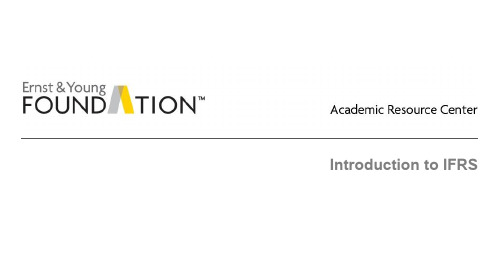
Introduction to IFRSAccounting in the international spotlightThe movement toward International Financial Reporting Standards (IFRS) represents an exciting development unprecedented in the world of financial accounting.It’s time to see what is going on in the international spotlight!Let’s take a tour through the world of international accounting!What is the outlook for IFRS adoption?What is the history of international standard setting?Why is it important to learn about IFRS today?How are the international standards set?What is the structure of the international standard setters?Who are the international standard setters?StartWhat is IFRS?Is IFRS different or better than USGAAP?On your tour, click the globe icon on the bottom right hand corner of relevant slides to return to this home screen.How are the US and international standard setters working together?What is IFRS?►IFRS stands for International Financial Reporting Standards.►As indicated within the title, these standards are aimed at a global practice.►Ultimately, the goal is to achieve a single set of high-quality, common accounting standards used around the world.►These standards are the result of a convergence of international viewpoints.►These standards are for publicly accountable entities.►Small and medium-sized entities (SMEs) that do not have public accountability may use a simplified version of IFRS known as IFRS for SMEs.►IFRS for SMEs has recently been accepted for non-SEC registrants by the AICPA as an acceptable alternative reporting standard to US GAAP; however, it is not yet common practice.Is IFRS different than US GAAP?►There are differences between IFRS and US GAAP but they are more alikethan different for most commonly encountered transactions. ►IFRS is largely grounded in the same principles as US GAAP.►The US and international standard setters are currently working on convergence projects to better align the standards and reduce these differences.= ?/►It cannot be stated that IFRS is better (or of higher quality) than US GAAP nor that US GAAP is better (or of higher quality) than IFRS. Neither set ofstandards is perfect.►This is evidenced by the convergence efforts where changes are being made to both sets of standards and are not one-sided.►Some could say that the international standard setters have had the following advantages in their standard setting:►Being able to obtain a greater amount of global perspective.►Being able to draw upon the latest standards.►Being able to remedy perceived problems identified in practice.►Having an annual improvement process to enhance the clarity and consistency of IFRS, which continues to consider more current thinking and practice.►Being able to focus more intently on a principles orientation.►As mentioned previously, both US GAAP and IFRS are largely grounded in the same principles.►As a general rule, however, IFRS standards are broader with less rules and limited interpretive guidance.►The international standard setters prefer to leave implementation of the principles embodied in the standards to preparers and auditors and its interpretive body.►US GAAP contains underlying principles as well but is more specific and rules oriented with far more “bright lines,” comprehensive implementation guidance and industry interpretations.The following example is a simple illustration of a principles-oriented approach compared to a rules-oriented approach. Rules oriented:►Your parents tell you to get a 3.2 GPA or above. ►They provide you with 15 contingencies that might justify acceptance ofanything lower than a 3.2 GPA.Principles oriented:►Your parents tell you to do your best to get good grades.►If you do not get good grades, they will consider the substance of your reasons.International Accounting Standards Board (IASB):►The IASB develops IFRS.►The IASB is an independent group of 15 full-time members. ►The board intends to expand to 16 members by 2012.►These members are appointed by the trustees.►Members of the IASB are selected and considered for reappointment through an open and rigorous process, which includes advertising vacancies and consulting relevant organizations.►Board members must comprise a group of people representing, within that group, the best available combination of technical skills and background experience of relevant international business and market conditions.Who are the international standard setters?Hans Hoogervorst is currently the IASB Chairman.►He is the former chairman of the executive board, the Netherlands Authorityfor the Financial Markets and a former chairman of the IOSCO technicalcommitteeOn July 1, 2011, a vice-chairman position was created to assume some ofthe chairmanship responsibilities. This position was assumed by IanMackintosh.►He was formerly chairman of the United Kingdom Accounting StandardsBoard.The term of both of these individuals will end on June 30, 2016.Click on the names above to learn more about each of these individuals. Photos from Who are the international standard setters?Amaro Luiz de Oliveira Gomes– BrazilChungwoo Suh– KoreaDarrel Scott – South AfricaMary Tokar– Noth AmericaMartin Edelmann– GermanySuzanne Lloyd–Patrick Finnegan – USGary Kabureck– North AmericaPhillipe Danjou – FranceStephen Cooper – UKTakatsugu Ochi – JapanZhang Wei-Guo – ChinaInternational Accounting Standards Board (IASB)IFRS andIFRS for SMEsIFRS Advisory CouncilIFRS FoundationIFRSInterpretations CommitteeMonitoring BoardIFRS FoundationInternational Accounting Standards Board (IASB)IFRS andIFRS for SMEsThe IFRS Foundation is a not-for-profit organization that oversees the development of the IASB’s international reporting standards for general financial statements.Monitoring BoardIFRSInterpretations CommitteeIFRS Advisory CouncilInternational Accounting Standards Board (IASB)IFRS andIFRS for SMEsMonitoring BoardThis group assists innominating and appointing individuals to IFRSFoundation trustee positions.IFRS FoundationIFRSInterpretations CommitteeIFRS Advisory CouncilInternational Accounting Standards Board (IASB)IFRS andIFRS for SMEsThe IFRS Advisory Council is the IASB’s forum for consultation with representatives from user groups, preparers, financial analysts, academics, auditors, regulators and professional accounting bodies.Monitoring BoardIFRS FoundationIFRSInterpretations CommitteeIFRS Advisory CouncilInternationalAccountingStandardsBoard (IASB)IFRSand IFRS for SMEsIFRSInterpretationsCommitteeThe IFRS Interpretations Committee releases interpretations (IFRICs) on newly identified financial reporting issues not dealt with in an IFRS and unsatisfactory or conflicting interpretations in areas without appropriate authoritative guidance.Monitoring BoardIFRS FoundationIFRS Advisory Council1960s 1970s 1980s 1990sProposal to create an accountants’ international study group►The IASC is formed in 1973.►The IASC begins promulgating International Accounting Standards (IAS).The IASC expands.►In 1994, the IASC Advisory Council is formed to provide oversight of IASC. ►In 1997, the Standards Interpretations Committee (SIC) is formed ►In 1999, the IASC is restructured to form a new board: the IASB. ►FASB agrees to work on a joint earnings-per-share project.2000 through 2011►In 2000, the initial 14 members are appointed to the IASB.►In 2002, the IASB begins promulgating standards as IFRS from IAS. The SIC becomes the IFRIC. The European Union endorses IFRS for 2005 adoption.►In 2002, the Norwalk Agreement is executed between the IASB and FASB.►In 2005, the SEC published a roadmap (Roadmap) for elimination of a US GAAP reconciliation for FPIs.►In 2006, the FASB and IASB published a Memorandum of Understanding, to set forth priorities in their joint work program.►In 2007, the SEC eliminated the US GAAP reconciliation for FPIs.►In 2008, the SEC published a proposed Roadmap anticipating the mandatory adoption of IFRS in the US.►In 2009, the FASB and IASB reaffirmed their commitment to the MOU.►In 2010, the SEC established a Work Plan and reaffirmed a 2011 decision date on IFRS adoption.►In 2011:►May: the SEC issued a staff paper outlining a possible approach for incorporation known as condorsement►June through August: the SEC conducted public outreach►November: the SEC conducted public outreach►November: the SEC issued a staff paper on a comparison of US GAAP and IFRS and a staff paper on an analysis of IFRS in practice around the world►December: the SEC delayed its adoption decision several months to post-2011.How are international standards set?AgendaDiscussion paper(DP)Post-implementation meetingsExposure draft(ED)IFRSFeedback statementInput is received from: ►IFRS Advisory Council ►Working Group►International groups such as analysts, preparers, audit technical partners ►Special interest groups ►Local standard setters ►Regulators ►Political groupsPublic consultationPublic consultationResearchSetting the agenda►The IASB evaluates the merits of adding a potential item to its agenda mainly by reference to the needs of investors.►The IASB considers:►Relevance to users of the information and the reliability of information that could be provided.►Existing guidance available.►Possibility of increasing convergence.►Quality of the standard to be developed, taking into account the availability of alternative solutions, cost/benefit considerations and feasibility.►Resource constraints in terms of availability of expertise and additional research required.Return to “How are international standards set?”Plan the project, and develop and publish the DP►IASB decides whether to conduct the project alone, or jointly with another standard setter.►A DP is not mandatory, but is quite typical. The purpose is to explain the issue, and solicit early comments from constituents.►A DP includes:►Comprehensive overview►Possible approaches►Preliminary viewsReturn to “How are international standards set?”Develop and publish the ED►Mandatory step, it is the main vehicle for consulting the public.►Unlike a DP, an ED sets out a specific proposal in the form of a proposed standard.►The development of an ED begins with the IASB considering: ►Issues on the basis of staff research and recommendations.►Comments received on any DP.►Suggestions made by the IFRS Advisory Council, working groups and accounting standard setters, and those arising from public education sessions.Return to “How are international standards set?”Develop and publish the standard►After resolving issues arising from the ED, the IASB considers whether it should expose its revised proposals for public comment. The revised proposal would be in the form of a second ED.►In considering the need for re-exposure, the IASB:►Identifies substantial issues that emerged during the comment period on the ED that it had not previously considered.►Assesses the evidence that it has considered.►Evaluates whether it has sufficiently understood the issues and actively sought the views of constituents.►Considers whether the various viewpoints were aired in the ED and adequately discussed and reviewed in the basis for conclusions.Return to “How are international standards set?”IASB members hold regular meetings►The purpose is to help understand unanticipated issues related to the practical implementation and potential impact of proposals.►After a suitable time, the IASB may consider initiating studies in light of: ►Its review of the IFRS’ application.►Changes in the financial reporting environment and regulatory requirements.►Comments by the IFRS Advisory Council, the IFRS Interpretations Committee, standard setters and constituents about the quality of the IFRS.Return to “How are international standards set?”A comparison of standard-setting processes►The IASB standard-setting process is almost identical to that of the FASB. The following are steps the FASB takes to create a standard:►The FASB receives requests/recommendations for possible projects and reconsideration of existing standards from various sources.►The FASB Chairman decides whether to add a project to the technical agenda, subject to oversight by the Foundation and after consultation with FASB members.►The FASB deliberates the various issues identified at one or more public meetings.►The Board issues an ED. In some projects, a DP may be issued to obtain input at an early stage that is used to develop the ED.►The FASB staff analyzes comment letters, public roundtable discussion and any other information.►The FASB redeliberates the proposed provisions at public meetings.►The FASB issues an Accounting Standards Update describing amendments to the Accounting Standards Codification.Click here to read the entire standard-setting process from the FASB’s website.►The FASB and IASB have been actively working together on convergence efforts since 2006.►In early 2011, certain major convergence projects were prioritizedto allow the Boards the ability to focus on these projectsand strive for completion in 2011.►Some of these projects have been completed;however, the timing on many of these projects hasbeen extended based on comments fromconstituents.►Some project remain inactive and will not beaddressed by the Boards until the prioritized projectsare completed.►Major projects recently completed in 2011 include:►Fair value►Presentation of other comprehensive income►Balance sheet offsetting►Major projects currently underway include (see timing on the following slide): ►Financial instruments (classification and measurement, impairment and hedging)►Revenue recognition►Leases►Consolidation►Insurance contracts►Projects that have been inactive include financial statement presentation, reporting discontinued operations, financial instruments with characteristics of equity and emissions trading schemes.How are the US and international standard setters working together?Joint projects as of December 2011IFRS required or permittedNo action taken/date set for adoptionLocal GAAP based on legacy IASIn process of adopting or converting to IFRS Currently, there are 123 countries that either adopted or signed to adopt IFRS. Over the last year, several countries required or permitted IFRS such Canada, Japan and Brazil while several countries are impending in the near future as listed: ►Mexico – 2012►Argentina – 2012►Nigeria – 2012►India – Indian Accounting Standards are issued as converged with somecarveouts but the effective date is yet to be announced.What is the outlook for IFRS adoption? Global snapshotThe Work Plan►In 2010, the SEC set forth a transparent work plan (the Work Plan) to support a decision for incorporation of IFRS into the US financial reporting system. The following are the specific areas of focus within the Work Plan:►Sufficient development and consistent application of IFRS:►The SEC staff will evaluate the comprehensiveness and enforceability of IFRS as well the auditability and comparability of financial statements prepared using IFRS, both in concept and in practice. These efforts will include consideration of the IASB’s efforts to improve IFRS through its conversion efforts with the FASB.►Independence of the standard-setting process:►The SEC staff will consider the extent to which the IASB’s governance (including its Monitoring Board), composition, funding and standard-setting process continue to promote the reporting of full, fair and reliable financial information to support investors in their capital allocation decision making.►Investor understanding and education:►The SEC staff will consider investor understanding and education regarding IFRS, including the current familiarity with IFRS, the actions needed to facilitate further understanding and the time frame to do so.►Examination of the US regulatory environment:►The SEC staff will examine how the US regulatory environment would be affected by the further incorporation of IFRS into the US financial reporting system. While the SEC does not directly prescribe the provision andcontent of information provided to other regulators, such as industry and tax regulators, the SEC’s decision to incorporate IFRS likely would affect regulatory regimes and parties subject to those regimes.►The effect of IFRS on US issuers, both large and small:►The SEC staff will assess the scope and timing of potential approaches for US issuers to make the necessary changes to their accounting systems, controls and procedures, and contractual arrangements. The SEC staff also will consider the effect of IFRS in the US on an issuer’s ability to comply with corporate governancerequirements, including the requirements for audit committee financial experts, and requirements related to the accounting for litigation contingencies. In addition, the SEC staff will consider whether the cost of a potential transition to IFRS would be more burdensome for smaller issuers.►Human capital readiness:►The SEC staff will assess the readiness of all parties involved in the financial reporting process, including regulators, for the further incorporation of IFRS in the US financial reporting system. The SEC staff also will consider the constraints on the availability of individuals experienced in the application of IFRS and therequired education, training and time frame necessary to address these constraints.The Work Plan►Since its release, the SEC has been executing the Work Plan by:►Performing its own research.►Seeking comment from, holding discussions with, and analyzing information from constituents.►Considering the experiences of jurisdictions that have successfully incorporated or plan to incorporate IFRS into their financial reporting systems.►In May 2011, the SEC released a staff paper on the potential approach to incorporation of IFRS into US financial reporting system. This approach became known as “condorsement”and will be discussed shortly.►In November 2011, the SEC issued two staff papers that compare US GAAP and IFRS and analyze the use of IFRS in practice around the globe.Decision and approach►In 2010, SEC Chairman, Mary Schapiro, said that she expected the SEC to make a decision on IFRS incorporation in 2011. By then, the SEC wasexpected to have completed its Work Plan and the Boards wereexpected to have completed their priority convergence projects.However, as previously discussed, the Boards extended their timelineson priority convergence projects in response to comments fromconstituents.►In December 2011, at the AICPA National Conference on Current SEC and PCAOB Developments, SEC Chief Accountant , James Kroeker, announced a delayed decision about IFRS adoption and stressed the importance of the completion of the prioritized convergence projects in consideration of making a decision.►He also stated that while the SEC staff had completed the majority of its “fieldwork” related to the Work Plan, a few more months were needed to produce a final report. Additionally, he stated that his staff were in the process of developing an approach for consideration by the Commission.Decision and approach►The SEC decision to mandate the use of IFRS is generally described as a decision to adopt IFRS. However, there are several manners in which the US could move forward to IFRS that are not considered to be adoption in the pure sense.►In October 2010, the SEC provided a progress report identifying that most jurisdictions adopt IFRS with a mechanism in place for making changes to the standards. In other words, most jurisdictions follow either a convergence or endorsement approach.►Adoption: A jurisdiction practices under IFRS as issued with no modifications.►Convergence: A jurisdiction practices under national standards with efforts to converge differences with IFRS standards over time.►Endorsement: A jurisdiction reviews each IFRS standard as issued and determines whether the standard should be endorsed for practice with or without modification.►As previously mentioned, in May 2011, an SEC Staff Paper outlined a possible approach for incorporating IFRS described as “condorsement.” This approach would establish anendorsement protocol for the FASB to incorporate new or amended IFRSs into US GAAP.During a defined transition period (e.g., five to seven years), the FASB would work to eliminate differences between IFRS and US GAAP through standard setting.Decision and approach►Major themes from the feedback received on the May Staff Paper including strong support for the objective of a single set of high-quality globally accepted accounting standards with a general premise that an endorsement mechanism would be used to achieve this goal.Constituents also believed that further progress needed to be made on the convergence projects.►Some questioned whether a single set of accounting standards can be achieved if the FASB and SEC retain the ability to deviate from an IASB standard. Given that an incorporation mechanism is used in some other jurisdictions, consideration can be made for the US as well to try to seek as much convergence as possible while fully understanding differences rather than just abandoning the possibility of a single set of accounting standards.►There is also discussion about what type of threshold would be used to consider whether to endorse an IASB standard. IASB Chairman, Hans Hoogervorst, has said he believes the key to making a possible endorsement model work “is setting an appropriately high threshold for endorsement. This ensures that any deviations are extremely rare. If we end up with non-endorsements and carve-outs left and right, the gains of adopting IFRS will remain elusive.”Future of joint convergence efforts►At the 2011 AICPA National Conference, Leslie Seidman,FASB Chairman, noted that the FASB would like to workwith the IASB to complete the priority projects on revenuerecognition, leasing, financial instruments and insurance,but said “we do not believe indefinite convergence is aviable option, politically or practically.”►Hans Hoogervorst added that, while it is tempting tomaintain the status quo, “For the long term, the statusquo is an unstable way of decision making that inevitably leads to diverged solutions orsuboptimal outcomes.”►Both Chairman nevertheless said that the convergence process has been extremely useful in improving both US GAAP and IFRS and moving them closer together.►Many questions remain about when the SEC will make a decision on whether and, if so, how IFRS will be incorporated into the US financial reporting system. What is clear is that there is strong support for an endorsement-type approach and the retention of US GAAP. Optional use of IFRS has not been ruled out however.►Knowledge of IFRS provides an ability to practice accounting in the global marketplace.►Through convergence efforts, US GAAP continues to become more aligned with IFRS.►US practice of IFRS currently exists in the following ways: ►Foreign multinationals that report using IFRS have US operations. While some of these entities file IFRS financialswith regulators of foreign exchanges, some file with the SEC asforeign private investors (FPIs) under IFRS as well.►US multinational companies have foreign operations that are required to report using IFRS.►Many US companies are making assessments of the potential impact of adopting IFRS and IFRS convergence efforts on theircurrent operations.►Under IFRS 1, First-time Adoption of International Financial Reporting Standards, there is a variety of exemptions and options that the preparer may elect to utilize in the adoption process that need to be assessed to best position thecompany.►The IFRS adoption and convergence efforts impact much more than just the accounting function. Additional functions that are impacted include the following:►Information systems►Tax►Treasury►Investor relations►Sales►Human resources►Mergers and acquisitionsGiven the level of IFRS knowledge expected by US practitioners today, the AICPA now includes IFRS in the content specifications for the Certified Public Accountant exam.Academic Resource Center Introduction to IFRS Page 41Ernst & Young LLPAssurance | Tax | Transactions | AdvisoryAbout Ernst & YoungErnst & Young is a global leader in assurance, tax, transaction and advisory services. Worldwide, our 152,000 people are united by our shared values and an unwavering commitment to quality. We make a difference by helping our people, our clients and our wider communities achieve their potential.Ernst & Young refers to the global organization of member firms of Ernst & Young Global Limited, each of which is a separate legal entity. Ernst & Young Global Limited, a UK company limited by guarantee, does not provide services to clients. For more information about our organization, please visit .Ernst & Young LLP is a client-serving member firm of Ernst & Young Global and of Ernst & Young Americas operating in the US.© 2012 Ernst & Young Foundation (US).All Rights Reserved.SCORE No. MM4113C.。
- 1、下载文档前请自行甄别文档内容的完整性,平台不提供额外的编辑、内容补充、找答案等附加服务。
- 2、"仅部分预览"的文档,不可在线预览部分如存在完整性等问题,可反馈申请退款(可完整预览的文档不适用该条件!)。
- 3、如文档侵犯您的权益,请联系客服反馈,我们会尽快为您处理(人工客服工作时间:9:00-18:30)。
MEDICAL IMMUNOLOGY
MEDICAL IMMUNOLOGY
Characteristics of Innate and Adaptive Immunity Innate Immunity Adaptive Immunity Antigen dependent
Antigen independent No time lag
secondary immune responses:
* the second exposures to the same antigen . * more rapid, larger, more efficient at eliminating the antigen
Memory cells: B/T
(2) Components:
1) physical and chemical barriers : • mechanical defense: skin & mucous membrane blood-brain prevent the entry of pathogens blood-placental • biophysical defense: temperature, pH, soluble molecules 2) humoral factors: complement interferon (IFN) lysozyme 3) phagocytes: macrophage (M) ingestion of extracellular neutrophils(PMN) microbes by phagocytosis
spleen / lymph nodes / mucosal-associated lymphoid tissue (MALT)
where adaptive immune responses are
initiated
MEDICAL IMMUNOLOGY
2. Immune Cells
Immunocytes: cells that participate in immune response or relate to immune response. Including: Innate immune response: phagocytes、NK、B1
MEDICAL IMMUNOLOGY
2. Adaptive immunity
(1) General characteristics:
• • • • •
Set up after birth Non-heredity Difference among the individuals is acquired by antigen stimulation Can be transferred
MEDICAL IMMUNOLOGY
(2)Important features of adaptive immune responses
Specificity:
aa
Ag
c d b
Immune responses are specific to exposure antigens.
Immune system Anti-a antibody Effector T cell
Primary or central lymphoid organs:
bone marrow / thymus (/bursa of Fabricius in birds) where lymphocytes are generated
Secondary or peripheral lymphoid organs:
Theory: 43 hrs (自主学习:10hrs ) Experiment: 11 hrs (main building, floor 4/5) Teachers:
姚智、白虹、郁春艳、李宏钊
MEDICAL IMMUNOLOGY
Week Theory Hours 1 Introduction 3 Antigen 3 2 Antibody 3 Complement 3 3 CK、CAM 2 MHC 2 4 Lymphocytes 5 6 APC 2 7 Immue response 4 7/8 Hypersensitivity 6 8/9 Immunoassay 10 immunotherapy 10 or 11 Final Exam.
Medical Immunology: 谭锦泉,姚堃主编, 科学出版社
MEDICAL IMMUNOLOGY
Functions of immunity:
1) immunologic defence (免疫防御)
ቤተ መጻሕፍቲ ባይዱ
2) immunologic homeostasis (免疫稳定)
3) immunologic surveillance (免疫监视)
MEDICAL IMMUNOLOGY
Composition of immune system
• Immune organs • Immunocytes • Immune molecules
MEDICAL IMMUNOLOGY
MEDICAL IMMUNOLOGY
1. Immune Tissues and organs
MEDICAL IMMUNOLOGY
抗 原(引起免疫应答的物质) 免疫系统 免疫器官 免疫细胞 免疫分子 免疫应答 非特异性免疫 特异性免疫 免疫效应 生理效应 抗感染免疫 抗肿瘤免疫 免疫耐受 病理效应 超敏反应 自身免疫病 免疫缺陷病 免疫学应用 : 免疫诊断、免疫治疗、免疫预防
MEDICAL IMMUNOLOGY
Memory: Immune response was enhanced by
MEDICAL IMMUNOLOGY
the second stimulate of the same antigen. primary immune responses:
the first exposures to the antigen
MEDICAL IMMUNOLOGY
1. Innate immunity
exist before infection provides the first line of defense against infection rapid response to microbes react in the same way to repeat infections
MEDICAL IMMUNOLOGY
Functions
Immunologic Defence Immunologic Homeostasis Immunologic Surveillance
Formal phenotype Abnormal phenotype
anti-infection hypersensitivity immunodeficiency eliminate injured or died cells discern mutant cell - (anti-tumor ) prevent consecutive infection autoimmue disease
tumor or consecutive infection
MEDICAL IMMUNOLOGY
Results of Immunity:
beneficial (normally)/ injurious (sometimes)
The result of immune responses is not always to protect the host, sometimes can cause tissue injury and disease.
* Abnormalities in self-tolerance lead to autoimmune diseases.
MEDICAL IMMUNOLOGY
(3) Components:
• T cell: mediate cellular immunity:
• B cell : mediate humoral immunity
Experiment
Hours
Neutralization Observation of Immu. organs Immunoelectrophoresis Demonstration, ELISA
2 2 2 2, 3
MEDICAL IMMUNOLOGY
References
医学免疫学 第6版: 曹雪涛主编,人民卫生出版社 医学免疫学 第3版: 安云庆主编,北京大学出版社 Cellular and Molecular Immunology: Abul K. Abbas
MEDICAL IMMUNOLOGY
Medical Immunology
Department of Medical Immunology Basic Medical College Tianjin Medical University
白 虹 2015, 9
MEDICAL IMMUNOLOGY
Schedule
Types of immunity
• Innate immunity
•
( natural immunity/ native immunity/ non-specific immunity ) Adaptive Immunity ( acquired immunity/ specific immunity)
